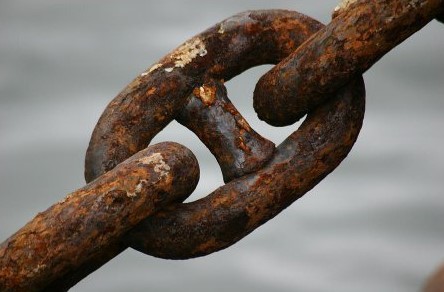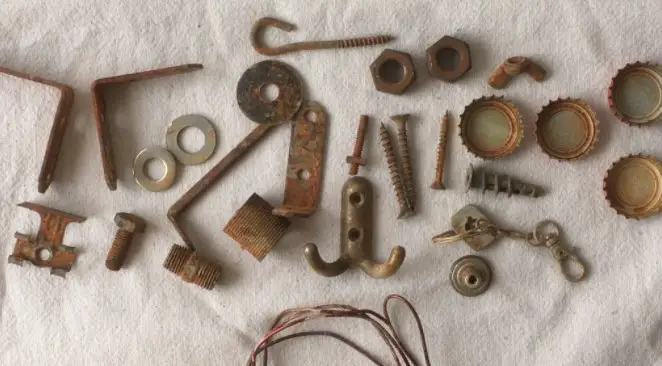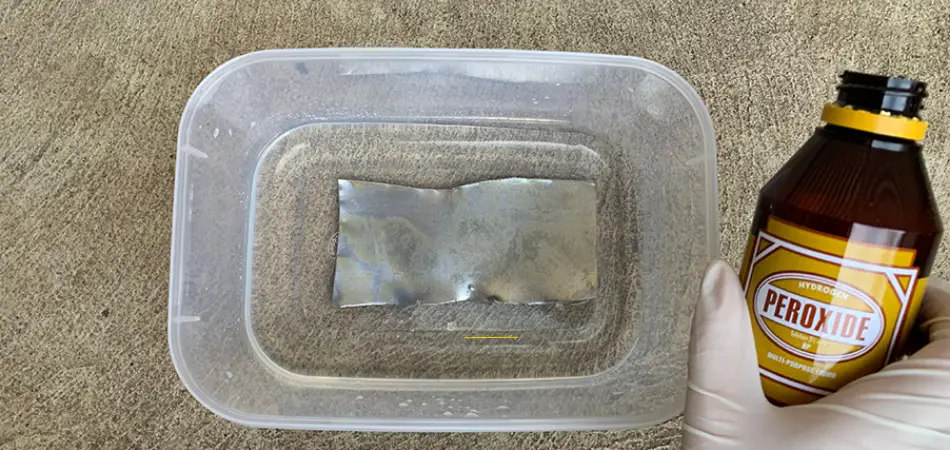One of the things that one has to prevent with metals is rust. While there are many things we do rightly, some we do that hurt the metals we have or work with. On this page, we will focus on the impact of hydrogen peroxide on metals. So, does hydrogen peroxide rust metal?
Yes, Hydrogen peroxide can cause rusting when it comes into contact with metal. The discoloration is due to the formation of a mercury salt compound that forms on the metal surface, often in a red-brown stain.
Pure hydrogen peroxide is a relatively stable compound formed by two hydrogen atoms and two oxygen atoms (H2O2). Because it breaks down naturally into hydrogen and water, it is frequently used as a powerful disinfectant and oxidizing agent.
However, because it contains water molecules in its composition, pure hydrogen peroxide can cause metals to rust over time. You can find more information on this below.
Contents
Why Will You Need to Rust Metal?
Generally, we try to prevent metals from rust, and seemingly prolong their lives. However, in metalwork, there may be a need to make metal rust, usually for aesthetic purposes called patina.

Patina, although not the right technical word, is the common parlance that describes the extent of use and exposure of metal (and some other materials) to the elements of weather, making it appear aged and possess some tarnish on its surface. This quality is usually used to beautify some metal works, especially those that need to appear brownish and tarnished.
The major purpose of intentionally rusting metal is to make them appear as though they have been in use over a long period, giving them an antiquated quality as desired by the manufacturer or customer. The compounds formed on the surface of the metal as a result of rust may be coated to remain in place and preserve that quality.
Instead of waiting for the naturally occurring rust on your metals, which may take a considerably long time, you have the option of causing rust on your metal or steel and making your work faster.
Can Hydrogen Peroxide Rust Metal?
Yes, hydrogen peroxide can rust metal. It can achieve this by causing an oxidation reaction that makes the iron ion (Fe++) combine with the hydroxyl ion to form FeOH, which is the brownish powdery substance you see as rust on metals.

Hydrogen peroxide is an oxidizing agent. It is an acidic substance, due to the presence of hydrogen ions, that readily oxidize a metal. The presence of both hydrogen and oxygen atoms, as in water, makes it a suitable corrosive substance, that can rust metal.
Although hydrogen peroxide is effective at rusting metals, it is more effective when it is combined with white vinegar and table salt. Together, and in the presence of light, hydrogen peroxide rust metals faster than the elements of weather such as water, air, and light.
Which Metals can Hydrogen Peroxide Rust?
There are different types of metals for different purposes, but can hydrogen peroxide cause rust on all of them? Depending on the constituent elements in the metal in question, yes, hydrogen peroxide can cause rust on most metals.
Most types of metal have a percentage of iron in them, except the non-ferrous ones, such as aluminum. Some also contain copper, such as brass. Understanding the nature of the metal you’re looking to rust is essential in knowing what material works best to accomplish that.
Hydrogen peroxide will cause rust on all ferrous metals, such as steel, carbon steel, alloy steel, wrought and cast iron, and copper and its alloys. The ferrous metals will form the brownish0-red rust coloration when acted on by hydrogen peroxide. However, the copper-based metals, such as bronze and brass, will turn greenish and stop corroding.
How to Use Hydrogen Peroxide to Rust Metals
To speed up the rusting process, using hydrogen peroxide, white vinegar, and table salt as the main materials, follow this process.
Materials: metal, paint stripper, sandpaper, workbench, white vinegar, spray bottle, hydrogen peroxide, table salt, heat, clear acrylic sealer.
Procedure:
- Move the metal you need to rust onto the workbench, in an open space, and preferably under the sun, as a source of heat.
- If your metal is painted, remove the paint by using the paint stripper on it. Different paint strippers may have different application instructions, follow the manufacturers’ instructions, as stated on the product package.
- Sand the metal lightly to remove any protective covering on the metal, preventing weathering rust.
- Place the metal on a plastic surface or bowl to prevent reaction with the reagents you will be using.
- Transfer some white vinegar into a plastic spray bottle. Spray the metal with some white vinegar and leave it under the sun to air dry. The corrosion of the metal begins with vinegar.
- Mix four tablespoons of white vinegar, one and a half teaspoons of table salt, and two cups of hydrogen peroxide in a plastic bowl. Transfer the mixture into a plastic spraying bottle. Shake the mixture vigorously to enable the salt to dissolve.
- Spray the metal with the mixture. Rust appears immediately after hydrogen peroxide comes in contact with the metal. Let the metal air-dry.
- Repeat the previous process as many times as the distinct rust patina you desire.
- Seal the rust in by applying a coat of clear acrylic sealer to the rust metal surface.
Final Thought
Hydrogen peroxide, an oxidizer, and acid that rust metals that contain the iron and copper elements, produce a rust patina that is useful in creating aesthetic designs for rustic designs. Combine it with white vinegar and table salt for the best results.


